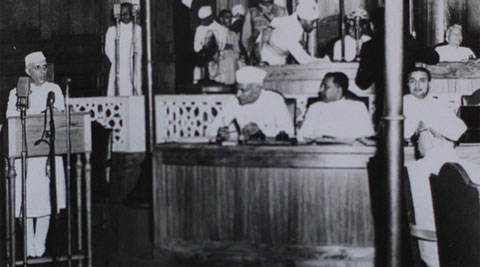Inder Malhotra
The Indian Express
12 November 2014
The Mahatma was
India’s liberator and Jawaharlal Nehru, its moderniser as well as founder of
its secular and “socialistic” democracy. Assiduously, he shaped and nurtured
every institution that underpins the democratic system. Among these, Parliament
was of paramount importance. Nehru devoted much of his time and energy to
ensure that it functioned smoothly and effectively in both its roles — as the
voice of the people and as a keen watcher of the government that could last
only as long as it retained the confidence of the Lok Sabha, originally named
the House of the People. For the last several decades, Parliament has been
greatly devalued and often made dysfunctional by its own “honourable” members
who think nothing of rushing into the well of the House and even using a
pepper-spray there. The character of the Rajya Sabha or the Council of States
has been distorted to the point of destruction by a joint effort of all
political parties, even though some of them detest one another. In Nehru’s
time, things were totally different. The British political scientist, W.H.
Morris-Jones, already quoted in this series, wrote that India’s Parliament was,
in some ways, “Nehru’s sound box or tuning fork”, but it had also become the
“Grand National Council” to debate and decide on all national issues, and
should therefore be a “role model” for nations that were being liberated from
“Western colonial rule”. He deservedly gave Nehru full credit for this.

Having covered Parliament
for long years, I have been witness to the great respect Nehru always showed
it. He attended it regularly, unlike some prime ministers in later years. He
also treated all its members with regard. After the Bandung Conference in 1955,
he had invited President Gamal Abdel Nasser of Egypt. Nehru noted the visitor’s
surprise at the number of communist MPs present at a reception in his honour
and said to him: “Gamal, you put your communists in prison; I put them in
Parliament.” Alas, sometimes, Nehru had to teach many MPs not only
parliamentary norms but also elementary manners. For instance, in the spring of
1951, Parliament’s first late-night sitting became necessary because of the
urgency to pass a particular bill. All concerned were also promised dinner. The
moment the meal began, there was a virtual rain of chicken bones on the grassy
plot. Nehru handed his plate to someone and started picking up the discarded
bones. In the ensuing shockwave, everyone joined him shamefully. Several were
the occasions when his role was that of a teacher for the whole House. For
instance, in an illuminating speech once, he told the MPs that the mere size
and bravery of the troops weren’t enough. Technology mattered more. The first
invention that had changed the nature of war was that of the stirrup. It gave
the Tatars huge superiority over rival horsemen. From this grew the concept of
the centaur. On another occasion, when he spoke on the possible consequences of
a nuclear conflict, it was visible from the press gallery that not only MPs but
even his cabinet colleagues were taken aback by his revelations. They seemed to
be unaware of what was at stake until Nehru declared that after a nuclear
holocaust the “living would envy the dead”. At one stage in the mid-50s, Feroze
Gandhi, Nehru’s son-in-law and a very hardworking Congress MP, won fame by
exposing various scandals. The climax was reached in 1958, when he unveiled
what came to be known as the “Mundhra Affair”. It related to the Life Insurance
Corporation’s dubious investments in Mundhra’s near-bankrupt firms. Feroze’s performance
was devastating and was applauded by both sides of the House. Nehru began his
response by welcoming the “majesty of Parliament” and ended it by instituting
an inquiry by Justice M.C. Chagla. Consequently, Finance Minister T.T.
Krishnamachari had to resign, and several top officials lost their jobs.
Nehru’s habit of threatening to resign frequently is well known. But the two
occasions when he did so in Parliament are noteworthy. One was when he firmly
rejected a conservative Congress member’s resolution demanding a complete ban
on cow slaughter. The latter had the temerity to claim that a majority of the
ruling party backed him, whereupon Nehru thundered: “I would rather resign than
accept this futile, silly and ridiculous demand.” The other occasion was much
more serious. For the first and last time, he read a written statement to his
party to say that he had “grown tired and stale… and had decided to give up his
office, even if temporarily”. For a minute there was stunned silence, and
then the loudest shouts of “no, no”. Eventually, he was persuaded to stay
and take a brief holiday in the hills. From 1959 until the humiliating defeat
in the border war with China in 1962 was the toughest time for Nehru in
Parliament. His China policy understandably came under sharp attack. Even his
staunch admirers on the treasury benches silently agreed with the opposition’s
criticism. However, except for rare occasions, his critics continued to treat
him with respect. Even at the height of heated exchanges, there could also be
humour. For example, when Acharya Kripalani said that India’s agreement with
China on Tibet was “born in sin”, Nehru rose to say: “Come to think of it, all
of us are born in sin.” Prolonged laughter and cheers greeted this. Though he
sometimes rambled, Nehru usually dominated the debates. Only once he was beaten
by Syama Prasad Mookerjee, a powerful orator and founder of the Jana Sangh,
which later morphed into the BJP. After a spellbinding speech against the
Preventive Detention Bill, he addressed Nehru directly and said: “In my speech
there is not one word of mine. I have been quoting what one of our greatest
leaders had said in the Central Assembly in 1921 against the Rowlatt Act. His
name: Motilal Nehru.”
The
writer is a Delhi-based political commentator


कोई टिप्पणी नहीं:
एक टिप्पणी भेजें